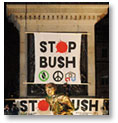
UNITED NATIONS (FinalCall.com) – “Why do they hate you, Mr. President?” asked the political editor of Britain’s ITV news, at a press conference in London during President George W. Bush’s recent visit. “I don’t know that they do,” the president replied.
International political analysts say that the “dislike” of Mr. Bush in Europe is the repayment with “interest” of an old slight, because the younger Bush and his closest advisers were dismissive of Europe in the early days of his administration.
After “spats” over global warming and the International Criminal Court, the Bush administration rebuffed NATO nations who had pledged their support after the terrorist attacks on September 11, 2001. Other slights followed, such as Mr. Bush’s sneer at the American reporter who dared ask the French president a question in French, in Mr. Bush’s presence, observers said.
Some observers say that many Europeans doubt that the American leader’s commitment to democracy in the Middle East is genuine, and they cannot fathom why the U.S. does not lean harder on Israel to secure a lasting peace.
–NEWS ANALYSIS–
An editorial in Der Standard, a Vienna daily stated: “George W. Bush did not choose a good time for his London visit, as the former hearty relationship between the United Kingdom and the United States is in a stressful phase.” Der Standard commented sarcastically that the photos of Pres. Bush in Buckingham Palace would certainly provide glamorous propaganda material for his election campaign in 2004.
In Beirut, Lebanon, the newspaper, As-Nahar called attention to a poll released Nov. 17 that was conducted in the UK on the American president, in the context of his visit to Britain. A columnist said the results of the poll revealed that 37 percent of the British population thought that Bush was “an idiot.”
At the United Nations, several diplomats were asked what they thought of the American president’s trip to the UK. All of them simply gave a look of dismay and said, “no comment.”
However, an Arab journalist, speaking on the condition of anonymity said, “The dizzying Buckingham Palace sleepover allowed no reported progress on Guantanamo Bay prisoners or the stalled Middle East peace process. There was not enough proof that the two leaders wished to comprehend the real causes of the visceral hatred that drove the bombers in Istanbul [Turkey].”
As The Final Call goes to press, French President Jacques Chirac is due to visit London for a summit with British Prime Minister Tony Blair. French columnists and political analysts state that, in contrast to the state visit by Mr. Bush, the two European leaders will be involved in a great deal of “detailed negotiations.”
“Relations between Tony Blair and Jacques Chirac are better now than they were 12 years ago,” the London-based Independent newspaper said, making a tongue-in-cheek reference to the split over Iraq that still plagues Franco/American relations. The paper also said that Mr. Chirac would step around embarrassing his friend, Tony Blair, by not reminding him publicly about the dangers of occupying Iraq.
But French commentators were not as polite–as they were savoring publicly the headline in the prestigious Washington Journal that “the French were right” all along in opposing the U.S.-led war in Iraq.
“Of course, there is a feeling we were right and they were wrong,” Etienne Schweiguth, a researcher at the Center for Study of French Political life in Paris said.
France’s leading newspaper, Le Monde, was reporting while Mr. Bush was in London, that “French fries and French bread are back in favor” in Washington.
Le Monde reported what people on the streets of Paris were saying. The newspaper quoted a young Algerian businessman, who noted that “Bush wants to be re-elected next year and politicians change ideas like shirts.” A French woman said, “France should give America some diplomatic help in Iraq, but that’s it.”












